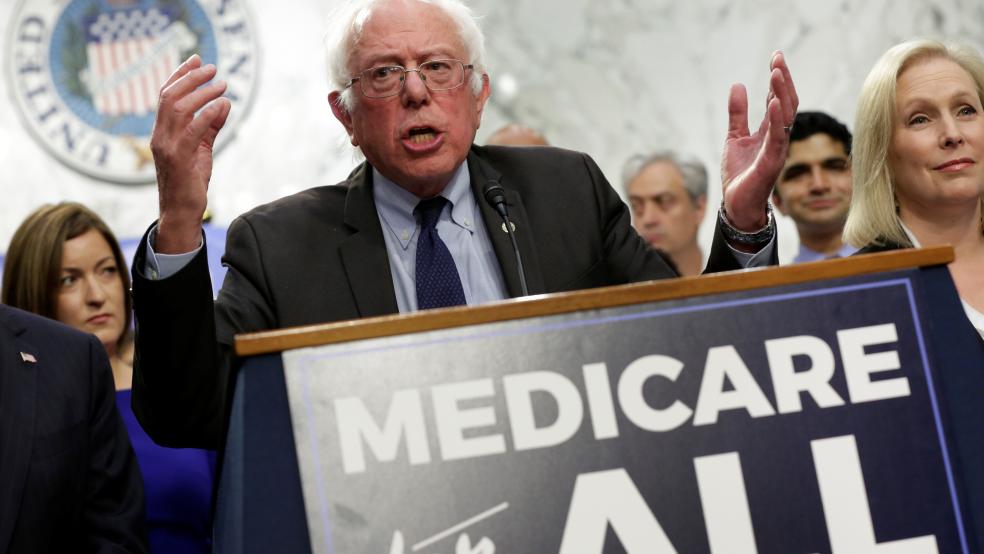In a wide-ranging interview with CNBC’s John Harwood published Tuesday, Bernie Sanders said he doesn’t think he needs to lay out a detailed plan to finance his Medicare for All proposal right now, but he insisted he will pay for “every nickel” of it and that an “overwhelming majority” of Americans would wind up saving money.
Trying to pay for Medicare for All: “You’ve identified revenue sources for about half of it. Do you think it’s important to identify revenue sources for the other half?” Harwood asked the Vermont senator. “Or do you believe, as those who subscribe to modern monetary theory believe, that we’ve been a little bit too constrained by concerns about the deficit?”
Sanders responded that he’s “trying to pay for the damn thing,” seemingly dismissing the idea of running up the deficit. But he said his current emphasis is on getting Americans to understand just how expensive the current system is compared to those in other countries.
“The fight right now is to get the American people to understand that we’re spending twice as much per capita, that of course, we can pay for it. We’re paying it now in a very reactionary, regressive way. I want to pay for it in a progressive way,” Sanders said. “You’re asking me to come up with an exact detailed plan of how every American — how much you’re going to pay more in taxes, how much I’m going to pay. I don’t think I have to do that right now.”
When Sanders introduced his Medicare for All bill earlier this year, he also released a list of what he described as “options” for paying for the plan and called for “vigorous debate” about the best way to finance the legislation. The options Sanders presented — including a wealth tax and higher income taxes on people making above $10 million a year, a 4% tax on families earning over $29,000 and a 7.5% tax on employers — would only cover about half the cost of his health plan, as Harwood said. And Sanders hasn’t made clear which options he would choose and how he would raise the trillions more he’d likely need to fully fund a transition to a government-run system.
On the budget deficit: Harwood also asked Sanders about how the deficit might or might not grow if he becomes president. “Under Trump, what we have seen is a huge increase in the deficit. I think I will do a lot better than Trump,” Sanders responded. “Every major proposal that we have brought forth — whether it’s Medicare for All, dealing with climate change, transforming our energy system, making public colleges and universities tuition-free and eliminating all student debt in America — that’s all paid for.”
Why it matters: Rival Democratic candidates (and the media) have been pressing Elizabeth Warren for more details on how she’d fund Medicare for All. Some have also offered faint praise for Sanders’s honesty in acknowledging that middle-class taxes will have to go up. In that context, the Vermont senator’s comments will open him up to fresh criticism just as Warren prepares to issue a more detailed financing plan.
“Sanders wants to sell Americans on something that covers everyone for everything but not explain how that is possible,” The Washington Post’s Jennifer Rubin writes. “That, frankly, is no different that President Trump promising in 2016 that he had a fabulous health-care plan to replace the Affordable Care Act but was not going to share what it was.”
Why it matters, part 2: It’s also worth noting that, given the opportunity to openly embrace Modern Monetary Theory, a school of economic thought challenging some conventional notions about deficits and constraints to government spending, Sanders steered clear, as he has in the past, and insisted he’d pay for all his major policy proposals.





